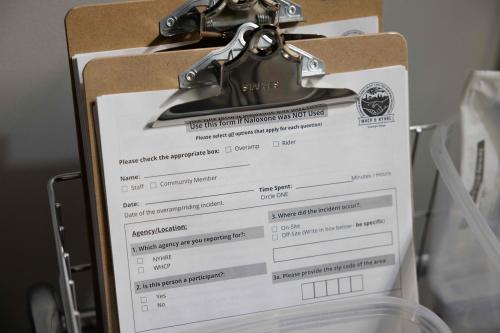Content from the Brookings Institution India Center is now archived. After seven years of an impactful partnership, as of September 11, 2020, Brookings India is now the Centre for Social and Economic Progress, an independent public policy institution based in India.
From a policy perspective, there are still so many unknowns, but it is helpful to try to focus on three key areas and understand how we can learn from past epidemics/pandemics to best inform the unfolding Zika pandemic writes Kavita Patel
The ongoing issues related to the prevention, diagnosis and treatment of the Zika virus are still emerging, however the policy implications have certainly taken shape. The President’s recent budget includes an $1.8 billion request from Congress to respond to the Zika virus, which is a mosquito-borne illness discovered in Uganda in 1947 but has since spread across Asia and to the Americas. Recent outbreaks of Zika in pregnant women have been found to be linked to very serious health conditions such as microcephaly (a birth defect resulting in tiny heads) and Guillain-Barre Syndrome (an immune-mediated neurologic condition). The virus has been declared a pandemic which according to the World Health Organization refers to the worldwide spread of a disease. There is no vaccine and no treatment for Zika; only an antibody test to find out if you have it, which is far from perfect.
The implications of Zika in the United States are still unfolding; while there might have seemed like an increased succession of potentially deadly viruses over the past decade (H1N1/Avian Influenza, Chikungunya, Ebola), the policy response is complex: overshooting the response results in potentially wasted dollars and misaligned resources. But underestimating the need is not only a health crisis, but potentially even more expensive as resources usually need to be marshaled quickly and with little planning. The current budget request proposes money across many of the agencies which deal with healthcare as well as the State Department, given the global implications of the pandemic and worldwide scale of the virus.
From a policy perspective, there are still so many unknowns, but it is helpful to try to focus on three key areas and understand how we can learn from past epidemics/pandemics to best inform the unfolding Zika pandemic.
- Vaccine Development: There is currently no advanced vaccine for Zika in development. This stands in contrast to the Ebola virus which had several vaccines in the pipeline when it reached pandemic status and a funding mechanism in place through the National Institutes of Health and other global agencies, along with private-sector life sciences companies. The population of interest is pregnant women which makes vaccine development even more complicated (since a live vaccine is usually contraindicated in pregnant women). Developing a live or inactive vaccine for the Zika virus might take as long as 10 years but the declaration of the pandemic and the White House request for funding will be geared towards accelerating that timeframe; perhaps the best place to draw upon policy lessons might be from how best to build on efforts across other countries’ investments; our dollars in research alone, in synergy with others, may have a stronger impact. Additionally, given the limits of vaccines, any vaccine development dollars must be accompanied with responsive public health measures to promote public awareness.
- Provider Preparedness: If annual influenza vaccination rates are any indication, a successful vaccine alone is not enough. Providers, local public health officials, and community-based organizations must be part of an overall pandemic strategy – previous Ebola screening efforts, as well as a lack of a standardized approach to readiness/response, resulted in much of the delay in diagnosis and potentially preventable patient outcomes, but it often feels as if most providers only respond and react rather than plan and prevent future scenarios. Tabletop exercises, mock scenarios, and spot testing of readiness should be a norm amongst provider organizations, and policymakers should think about how future reforms can sustain such efforts.
- Synergy across Government Agencies: Past efforts such as the Avian Flu (H1N1) and Ebola outbreaks involved coordination with the Defense Department and its research arm, DARPA (Defense Agency Research Projects Agency); this year’s Zika request does not contain such a request, likely because there is no vaccine in the pipeline; however, the experience of DARPA to scale and understand complex biologic processes should not be ignored, along with analogous agencies from our allies. The best “vaccine” for a pandemic such as Zika might be diplomatic given global implications.
The practical nature of these unpredictable pathogens is one our country will be wrestling with for generations; doing so in a fiscally responsible way will require different business models, regulatory flexibility but perhaps most importantly, a sense of institutional memory for past pandemics and the policies that shaped those responses.
Kavita Patel, Nonresident Senior Fellow, Economic Studies at the Brookings Institution
The Brookings Institution is committed to quality, independence, and impact.
We are supported by a diverse array of funders. In line with our values and policies, each Brookings publication represents the sole views of its author(s).



Commentary
Op-edZika virus: Policy implications and practical considerations
Brookings.edu
February 17, 2016